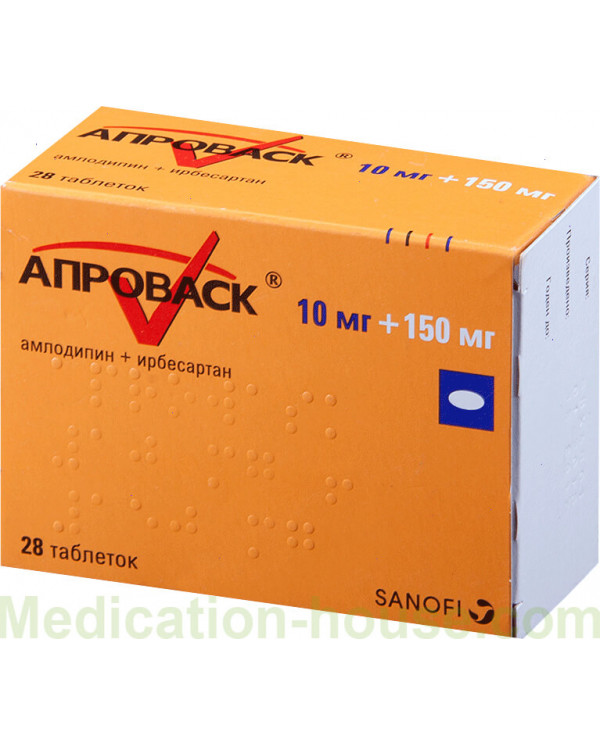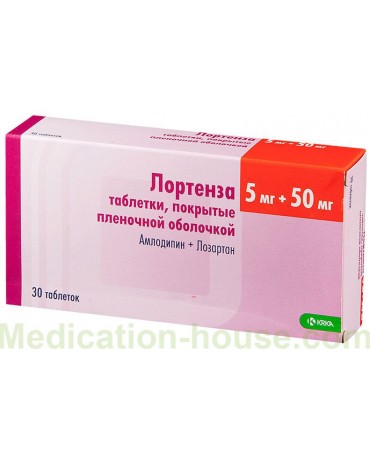Instruction for Aprovask
You can buy Aprovask here
Pharmacological properties
Aprovask is a drug designed to lower systemic blood pressure and is used to treat and prevent hypertension, protect against hypertensive crises and other pathologies of peripheral vascular spasms. The action of the drug is aimed at lowering blood pressure, the pharmacological effect is noticeable after the first intake of the medication, and after 4-6 weeks of treatment, the maximum therapeutic effect is achieved. The effect of the course of taking the drug lasts for one year. With a single dose of the drug, the patient feels a significant decrease in blood pressure. The action of the medication lasts up to two days after use. The drug is not addictive.
Composition and form of release of Aprovask
The main composition of the components of the medication:
amlodipine;
irbesartan;
MCC;
sodium croscarmellose;
methyl hydroxypropyl cellulose;
silica;
stearic acid magnesium.
The top layer of the drug Aprovask consists of hypromellose, titanium dioxide and polyethylene glycol. The medication is produced in the form of tablets, which are sold in packs of 5 and 10 tablets of 150 mg each. each and 5 and 10 tablets of 300 mg. each one. The medicine can be white, yellow, or pink.
Indications for use
The indication for prescribing a medication is the detection of hypertension in a patient.
Side effects of Aprovask
Taking the medication can cause a number of side effects, which are divided depending on the degree of frequency of occurrence in patients: frequent cases, infrequent symptoms, rare manifestations, very rare, indefinite degree of manifestation.
Often: swelling, heart palpitations, orthostatic collapse, vestibular disorders, migraines, weakness, loss of strength, swelling of the gums, protein formation in the urine, nausea, vomiting, pain in the abdomen, tongue dysfunction, fatigue, flushed face, skin redness, cough, tongue inflammation, simple dermatitis.
Uncommon: general weakness of the body, dizziness, irregular heartbeat, lower blood pressure, tingling and numbness, erectile dysfunction, problems with stomach bowel movements, increased blood levels of nitrogenous metabolic products, increased plasma creatine levels, high blood levels of potassium, limited joint mobility, joint pain, muscle pain, dizziness when getting out of bed, painful heart palpitations, loose stools, difficult and painful digestion, burning sensation in the esophagus, baldness, chest pain, vestibular disorders, sleep disturbances, drops mood, numbness of body parts, sensory disturbance, involuntary tremors of the limbs, fainting, temporary visual disturbances, tinnitus, rapid and difficult breathing, inflammation of the nasal mucosa, constipation, dry mouth, skin rashes, itching, small capillary effusions of blood on skin, increased perspiration a, involuntary muscle contractions, pain in the back, frequent urge to use the toilet, pain when urinating, nocturnal diuresis, impotence, breast enlargement in men, increase or decrease in body weight.
Rarely: facial swelling.
Very rare: a decrease in the number of platelets in the blood, allergies, urticaria, Quincke's edema, an increase in serum glucose, damage to peripheral nerves, damage to the heart muscle, increased ventricular contractions, atrial fibrillation, angiitis, inflammation of the pancreas, inflammation of the gastric mucosa, fibromatosis of the gums, inflammatory liver disease, yellowing of the skin, exudative erythema.
Frequency not determined: abnormally high concentration of potassium in the blood, tinnitus, cutaneous vasculitis, taste disorder, renal failure, impotence.
Contraindications Aprovask
There are a number of contraindications for prescribing the drug to patients:
increased susceptibility to the components of the medication;
extreme degree of left ventricular failure;
aortic valve stenosis;
NSC;
pregnancy;
lactation period;
patients under the age of 18;
renal failure;
diabetes;
lesions of arteries and arterioles.
Requires attention to dosage and duration of administration, prescribing medication to patients suffering from a number of diseases:
a decrease in the volume of circulating blood;
low concentration of sodium ions in the blood;
chronic acute disruption of the heart;
impaired liver function;
problems with kidney function;
obstructive cardiomyopathy;
Ischemic heart disease;
the formation of atherosclerotic plaques in the cerebral vessels;
sick sinus syndrome.
Application during pregnancy
There was no evidence and data on the harm and effect of the drug on the fetus and milk of a nursing mother. In order to avoid a threat to the life of the fetus and infant, it is prohibited to use the medication for pregnant women. If the medication must be used to get rid of diseases associated with changes in blood pressure, it is necessary to refuse breastfeeding during the course of the therapeutic course.
Method and features of application
According to the instructions for use, the medication should be taken orally with a small amount of water. You can take the medication at any time, regardless of the time you eat. The daily dose of the drug is one tablet per day. The dosage can be changed or increased only as prescribed by the attending physician after conducting the necessary clinical studies and collecting tests. With a portion of the medication of 150 - 300 mg. the maximum possible amount of the drug used per day is achieved.
Aprovask's compatibility with alcohol
The medication affects the functioning of the liver, therefore, the joint use of Aprovask with alcohol-containing drinks is not recommended, as this puts an increased burden on the organ. There are no direct restrictions on combining the drug and alcohol, but it is still better to refrain from taking alcohol while continuing medication therapy, since in any case the therapeutic effect will be reduced.
Interaction with other medications
There are no clinical data on the combination of taking Aprovask with other medications, negative consequences and a decrease in the therapeutic effect were not revealed when the components of different drugs were combined.
Overdose
In case of an overdose, the patient may develop symptomatic symptoms such as peripheral autonomic failure, increased tone of the sympathetic nervous system, excessive lowering of blood pressure, the development of a state of shock, and death. If symptoms appear, the patient should consult a doctor to prescribe an appropriate therapeutic course. The patient is placed in a hospital, where he is under the supervision of doctors, first of all, doctors do a gastric lavage, and then monitor the work of the heart and other important vital organs. To restore blood pressure and vascular tone, intravenous drugs that constrict blood vessels may be required.
Storage conditions
According to the instructions, the medication should be stored in a place isolated from the access of children at a temperature of no more than 30 ° C. The shelf life of the medicine is 3 years from the date of manufacture.
Terms of sell
You don't need a prescription to buy Aprovask.


